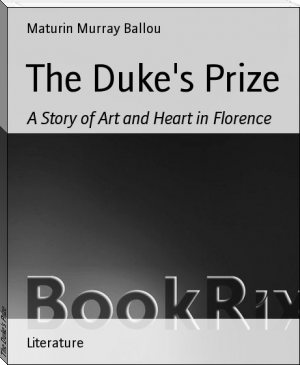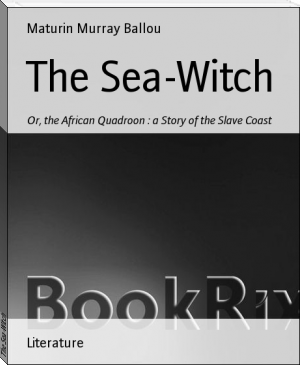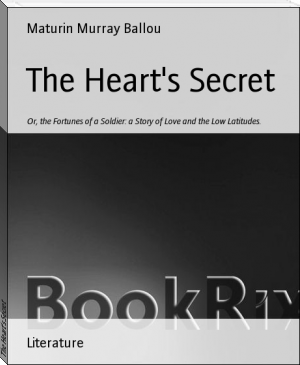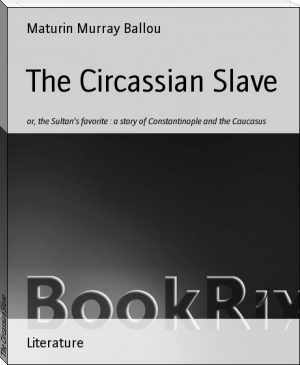The Duke's Prize by Maturin Murray Ballou (popular books of all time TXT) 📕

- Author: Maturin Murray Ballou
Book online «The Duke's Prize by Maturin Murray Ballou (popular books of all time TXT) 📕». Author Maturin Murray Ballou
The thought of the bare possibility of the connection as sanctioned by the duke, so embittered his feelings as to render him disagreeable to all about him. His conscious pride and self-interest both prompted him in this emergency; for in the case of Florinda's marrying Petro, as we have already intimated, there would be some important pecuniary interest of his own benefited thereby-and then his old aristocratic notions were shocked at the prospect of the plebeian match.
Now was poor Carlton cornered on the chequer-board of life, and he must play boldly, if he would reach the desired goal. He had those to deal with who possessed every facility and advantage successfully to battle him in his hopes and plans. But then he was no longer the poor painter, who did not know where his next meal was to be obtained; he was no longer the hungry artist-the butt and jest of his old companions. No! he was under the patronage of the Grand Duke, whose personal friendship he could boast. His brush brought him daily-or as often as he was pleased to exert himself-large sums of money; and his well-lined purse was significant of his unbounded success in his profession as an artist.
Carlton knew as well as those who had ever possessed the means, how best to employ them when at his command. His noble person was now garbed in the rich dress of a court favorite, while the plenty and comfort he now enjoyed had again filled his sunken cheek, and lit up the fire of his bright hazel eye; his hair, long and curling about his spirited and intelligent face, was the pride of Florinda, and the envy of the whole court.
His fellow-students of the academy were also but too happy to receive the least attention from their late companion; he now moved in a grade of society far above them-a circle which was as inaccessible to them as the throne itself. What was his return to them for the spirit they had ever manifested towards him? Did he retaliate and put them to shame? He did not retaliate, and yet he put them to shame-ay, his was a noble revenge; he returned them good for evil.
Carlton's kindness to those who had so illy treated him was unbounded; they received no such return from him-far from it. He encouraged in every way their studies, and even condescended gratuitously to teach them, and they were very ready and happy to thrive under his instruction. Thus did he heap coals of fire on their heads, showing them what sort of a spirit they had trampled on in its adversity.
"Whither away, in such haste?" asked one young artist of another in the streets of Florence.
"To Signor Carlton's, the American artist," was the reply.
"All Florence is after him-what want you?"
"He is to give a finishing touch to a bit of canvass for me."
"That's clever of him."
"Yes, since no one can do so well as he," was the ready acknowledgement.
Thus were the tables completely turned. Little did his former companions and fellow-students dream of this transition of good fortune to the share of him they had so lately scoffed at in the open streets of Florence. One, to see their ready obeisance now, and their earnest endeavors to please him, would hardly think they had ever treated him with less respect.
So goes the world. If ill fortune betide us, how many stand ready to give us a push on our downward course, and to scoff at our misery; but let the tide turn and set favorably on our bark, and none are so ready to do obeisance as those very curs who have barked and growled at us the loudest. Carlton, the court favorite, the unrivalled artist, the now liberal and wealthy Carlton, was a very different person from the threadbare artist who turned from his companions on the piazza at noonday.
He retraced his steps towards the grand gallery at that time, faint and hungry, because he had not the means to procure for himself a dinner, avoiding his fellow-artists to escape the mortification of expressing the extent of his poverty and want.
Carlton was in doubt as to the most proper course for him to pursue. He hardly dared to lay the matter in its present form before the duke, lest it might seem impertinent and obtrusive in him towards one who had already extended unprecedented kindness and protection towards him; and yet he knew no other source upon which he might rely. In this dilemma, Carlton grew quite dejected. He was one of those persons who, notwithstanding he possessed a strong mind and determination of purpose, was easily elated or depressed in his spirits; and the present state of affairs rendered him sad enough.
He was rudely repulsed in every endeavor to gain an audience of Florinda by the menials of Signor Latrezzi-who had been instructed to this effect by their master-and Carlton was obliged to content himself with an epistolary communication, having to conduct even this in secret.
At length one day, finding the duke in a happy mood and at leisure, he frankly stated the matter to him as it actually existed, and begged of him to advise him what course to pursue in the case.
"Signor Carlton," said the duke, kindly, after hearing him to the end, "I have little love for this uncle of Florinda's, and therefore avoid any issue with him, or I would openly express my wishes on this point. But as it is, Signor Americano, there are fleet horses in Florence, and ready postilions about the gates of the city, who know the route to Bologna over the mountains! Thou hast ridden in a cabriolet, signor?"
"A cabriolet?" repeated Carlton, inquiringly.
"Yes, there are plenty in Florence."
"Your highness is pleased to be facetious."
"Not at all."
"Then why speak of cabriolets in this connection?"
"Canst not take the hint?"
"Your excellenza speaks in riddles."
"One of thy discernment, Signor Carlton, should understand me."
"Would your excellenza have me clo--"
"I would not have you do anything but that which your own judgment should approve," interrupted the duke.
"Thanks, excellenza, I understand you."
"You may be assured of my friendship in all cases when it can be reasonably exercised," continued the duke.
"Your excellenza is ever kind."
A new field was opened for Carlton, and he was as much elated as he had heretofore been depressed; and he resolved to take the hint of the duke, and bring matters to an issue in the most summary manner.
Young Petro Giampetti immediately on his return to Florence, having learned the state of affairs between Carlton and Florinda, had resolved at once to challenge his rival; being an expert swordsman, and knowing Carlton's peaceful occupation, he made no doubt that he could easily despatch him in single combat, and thus rid himself of one who, to say the least, was a very dangerous rival.
In this frame of mind, Petro sought some cause of difference with Carlton other than the true one at issue-a quarrel could hardly be raised, inasmuch as the latter remained ignorant even of the pretensions of Petro, or the design of Florinda's uncle up to the time of their return from Bologna.
Failing otherwise to accomplish his purpose, Petro, whose standing and connection served him as a key to the royal presence, sought to offer at court some slight to Carlton, so public and marked as to render it necessary for him to demand satisfaction after the code of Italian honor. Three times, in pursuance of this object, he had vainly endeavored to accomplish his purpose; but each time, Carlton, basking in the sunshine of royal favor, turned by without notice the intended insult in such a manner as to show himself as feeling far above an insult from such a source, and again in so cool and diplomatic a manner, as to turn the very game upon poor Petro himself, who found that nothing save some open and decided offense could bring matters to an issue.
"You don't seem to get along very fast in this little matter," said one of his friends rather tauntingly to him.
"No, it doesn't look much like a draw-game between them, either," said another friend, venturing a pun.
"Curse him," growled Petro, "he's a coward, and wont take offence. What can a man do in such a case as that?"
"Carlton doesn't look to me just like a coward," said one of the speakers; "but he doesn't want to fight you, Petro."
"Can't help it," said Petro, "he must do it."
"Well, then, give him a chance, and have it over."
"I'll improve the first opportunity, believe me."
But Petro did not further annoy Carlton that evening; the coolness and self-possession he evinced quite nonplussed the angry Italian.
CHAPTER IX.
THE DUEL.
What folly 'tis to hazard life for ill.
-Timon of Athens.
AS we have said, Petro, finding that nothing short of an open and downright insult could bring Carlton to be the challenging party, therefore resolved to make a bold attempt to accomplish this. He was revolving this matter over in his mind, when an event occurred which led him to be the challenger in fact. He was strolling home from the weekly cordon of the Grand Duke one evening, and was just turning an angle of his uncle's palace walls, when hearing the voice of a female in answer to that of a man, he paused, and following the sound, discovered Florinda leaning from a balcony in the lower range of the palace, and in close conversation with his hated rival, Carlton. This was sufficient, under the circumstances, to raise all his fiery spirit, and he determined that it should serve him as a pretext for a quarrel.
Placing himself hard by where he knew Carlton must pass in his leave-taking of the palace, he patiently awaited his coming; and but a short time elapsed before Carlton, bidding good night to Florinda, was hastening from the spot, when he encountered Petro, whose dark countenance was the very picture of rage, while his large, dark eyes were wild with inward passion.
"Signor Carlton!"
"Signor Petro!"
They exclaimed, on confronting each other.
Carlton for a moment was thrown off his habitual guard, and losing his temper, was about to retort upon Petro with interest, both in frown and, if need be, with blows also. But recalling himself, he assumed his usual precaution, and looked upon the angry Italian coolly, and without the least exhibition of temper.
"Well, Signor Carlton."
"Well, Signor Petro."
"Your mock me, signor."
"You mock me, signor."
"Signor, you are my enemy."
"You seem to wish me so."
"This talk will not serve for you, signor."
"If you like it not, it were best for you to step on one side, and I will pass."
The Italian bit his lips with suppressed rage, and seemed too angry to trust even his voice; but he did not remain long silent.
"Signor Americano," said Petro, warmly, "you have insulted my uncle and myself by this secret interview with Signora Florinda, and I demand of you immediate satisfaction for it."
"Signor Petro, I have no cause for contention with you," was the reply of Carlton. "I know you love not the lady, and you are equally aware of her feelings





Comments (0)